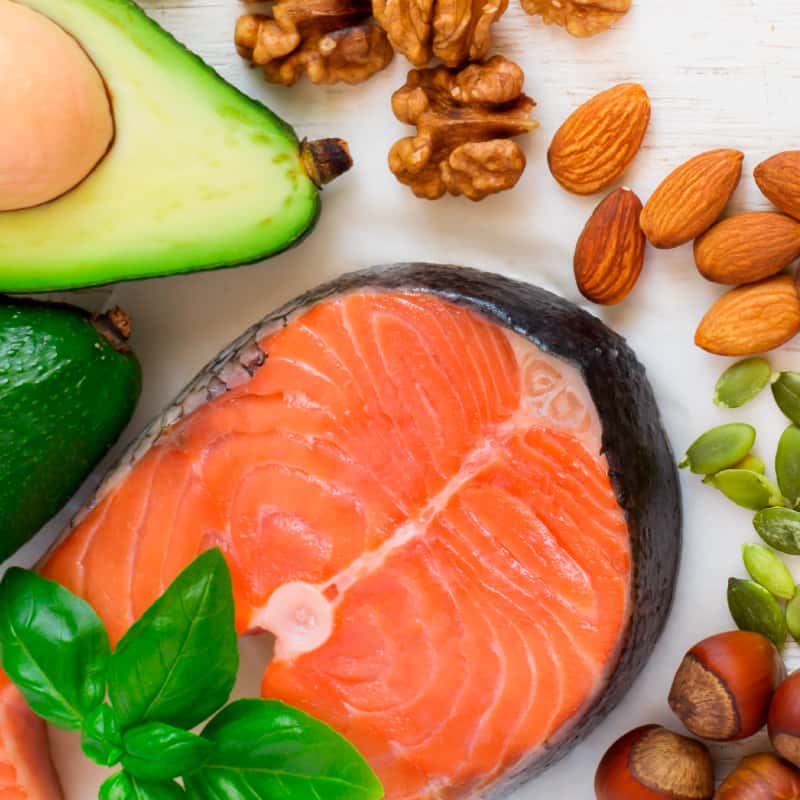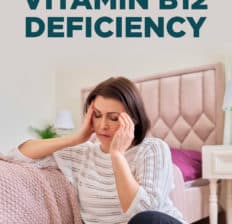This Dr. Axe content is medically reviewed or fact checked to ensure factually accurate information.
With strict editorial sourcing guidelines, we only link to academic research institutions, reputable media sites and, when research is available, medically peer-reviewed studies. Note that the numbers in parentheses (1, 2, etc.) are clickable links to these studies.
The information in our articles is NOT intended to replace a one-on-one relationship with a qualified health care professional and is not intended as medical advice.
This article is based on scientific evidence, written by experts and fact checked by our trained editorial staff. Note that the numbers in parentheses (1, 2, etc.) are clickable links to medically peer-reviewed studies.
Our team includes licensed nutritionists and dietitians, certified health education specialists, as well as certified strength and conditioning specialists, personal trainers and corrective exercise specialists. Our team aims to be not only thorough with its research, but also objective and unbiased.
The information in our articles is NOT intended to replace a one-on-one relationship with a qualified health care professional and is not intended as medical advice.
Vitamin B12 Deficiency Symptoms and How to Prevent and Overcome Low Vitamin B12
February 28, 2025

It’s estimated that up to 15 percent to 20 percent of all adults are at least marginally deficient in vitamin B12 (also called cobalamin). Some experts believe this number may actually be a lot higher, since it’s suspected that there are many cases of undetected vitamin B12 deficiency.
This means there are millions of people likely struggling with B12 deficiency who don’t even know it, especially the elderly and people who avoid eating animal products (vegans and vegetarians). It’s one of the most common nutritional deficiencies for women and men alike as well.
Commonly known as the “energy vitamin,” vitamin B12 may help improve your energy and assist you in overcoming exhaustion. It does this by supporting thyroid function and cellular methylation.
It’s also involved in synthesis of DNA, fatty acids and myelin that protect cells.
Since it’s a vitamin that’s essential for human life, people deficient in it can suffer from serious health issues if the problem is not addressed.
What is vitamin B12?
Vitamin B12 has the most complex and largest chemical structure of all vitamins, including other B vitamins. Unlike other vitamins, it contains cobalt (a metal) and is commonly referred to as “cobalamin,” a catchall term for all of the various compounds that contain vitamin B12 properties.
A few of the more important roles that vitamin B12 plays in the body include:
- Red blood cell formation
- Memory recall
- Cellular energy
- Nutrient absorption
- Adrenal gland support
- Nerve and brain regeneration
- DNA synthesis
- Female and male reproductive health
Vitamin B12 deficiency symptoms
What can happen if you have a vitamin B12 deficiency? Symptoms of vitamin B12 deficiency can include:
- Low energy or sometimes chronic fatigue
- Lack of focus and other cognitive difficulties
- Tension and weakness in muscles
- Poor memory
- Emotional mood swings
- Lack of motivation
- Female infertility
- Male low testosterone
- Digestive issues (like leaky gut or irritable bowel disease)
- Hypothyroidism
- Fatigue, even after getting a good night’s sleep
- Numb or tingling feeling in hands and feet
- Trouble walking
- Fast heart rate
- Nausea
- Smooth and tender tongue or mouth
- Decreased appetite
- Weight loss
- Irritability
- Diarrhea
- Lightheadness
- Shortness of breath
- Pale skin
- Blue or gray-brown nails
- Trouble speaking
- Depression
- Yellowish skin
- Behavior changes
Vitamin B12 deficiency anemia:
There are two different types of anemias linked to vitamin B12 deficiency. One type is known as megaloblastic anemia, in which red blood cells don’t develop normally and are abnormally large.
Another rare type is pernicious anemia (or “vitamin B12 anemia”), which is the official term describing vitamin B12 malabsorption, in which a person cannot properly absorb vitamin B12. Pernicious anemia can be caused by an autoimmune disorder that damages the stomach lining.
Typically people do not start to experience symptoms until after they are 30 years old, and the average age of diagnosis is 60. Pernicious anemia is quite complicated and very much involved with several organ systems in the body.
- Damage done to the stomach lining triggers a dangerous cascade of events that reduces stomach acid and prevents the body from properly breaking down foods.
- As the condition continues, a hormone called “intrinsic factor” is greatly reduced, which is necessary to absorb vitamin B12.
- People suffering from this condition require a significant amount of supplementation.
The key to treating pernicious anemia is to reduce chronic inflammation in the body.
According to the Linus Pauling Institute at Oregon State University, pernicious anemia and B12 malabsorption are associated with a chronic inflammatory disease in the stomach, referred to as atrophic gastritis (low stomach acid). This condition is associated with auto-antibodies that target stomach cells and bacterial infection. The ensuing inflammation can lead to peptic ulcers, SIBO and bacterial overgrowth.
Keep in mind that anemia can also be caused by lack of iron and folate/folic acid, so consuming and absorbing all of these nutrients is crucial.
Causes/risk factors
What is the main cause of vitamin B12 deficiency?
The two most common ways you become vitamin B12 deficient are through a lack of vitamin B12 in your diet or through your inability to absorb it from the food you eat.
What puts you at an increased risk for developing vitamin B12 deficiency?
You’re more likely to develop a deficiency in vitamin B12 if:
- You have had H. pylori bacterial infection or stomach ulcer
- You are over 50
- You have a family history of B12 deficiency
- You are a vegan or vegetarian
- You’ve had weight loss/bariatric surgery, since this surgery interferes with the release of B12 during digestion
- You have inflammatory bowel disease, leaky gut or other serious digestive disease
- You have acid reflux
- You’re a pregnant woman (who has increased needs for many nutrients)
- You take one of the following types of medications: antibiotics, anti-gout, blood pressure, birth control pills, cholesterol-lowering drugs, diabetes medications and antipsychotic drugs.
As you can see, many people are at risk, but it’s believed that by far the largest cause of vitamin B12 deficiency is malabsorption.
Like most health issues, it all starts in the gut.
Malabsorption of the vitamins from food is the primary cause of vitamin B12 deficiency. This malabsorption could be caused by a condition known as leaky gut and a lack of intrinsic factor, a protein made in the stomach.
One important factor to keep in mind is that as people age their gastric mucosa naturally shrinks. This makes B12 absorption issues more common and difficult to reverse.
This is one of the main reasons that older adults should either supplement or greatly increase their intake of vitamin B12-rich foods.
Other potential causes of B12 deficiency include:
- Gastritis
- Digestive diseases, such as Crohn’s disease and celiac disease
- Gastrointestinal surgery, such as gastric bypass
- Alcohol use
- Transcobalamin II deficiency, a rare genetic disorder that impairs the transport of vitamin B12 in the body
- Autoimmune disorder
Complications/related conditions
Is B12 deficiency serious or dangerous?
Being deficient in this crucial vitamin puts people at an increased risk of developing a number of symptoms and several diseases.
What are the long-term effects of B12 deficiency? Examples include:
- Stunted brain and intellectual development in children
- Anemia
- Asthma
- Depression
- Fatigue
- Kidney disease
- Macular degeneration
- Memory loss
- Migraine headaches
- Multiple sclerosis
- Neuropathy
- Pernicious anemia
- Shingles
- Tinnitus
What are the neurological symptoms of B12 deficiency?
A major risk of remaining deficient in B12 is experiencing cognitive difficulties. In fact, as it relates to neurological function, few vitamins are as critical as B12.
Being a co-factor of methionine synthase, it is heavily involved in different regulatory mechanisms and brain development. Studies have revealed that B12 deficiency later in life actually leads to brain atrophy (shrinkage) and higher risk for problems, including dementia and Alzheimer’s disease (regardless if people are “healthy” or not).
Elderly people who simply lack B12 are at risk of developing what German researchers refer to as “irreversible structural brain damage.”
Other neurological symptoms tied to this deficiency can include memory loss, difficulty thinking and reasoning, and higher risk for MS.
Vitamin B12 also benefits your mood, energy level, memory and entire central nervous system, so it’s also an essential vitamin for addressing symptoms like numbness or tingling. It’s also needed for conditions such as adrenal fatigue, mood disorders like depression, and negative effects of chronic stress or feeling run down.
How long does it take to recover from vitamin B12 deficiency?
It depends how severely someone is deficient and what type of dietary changes plus supplements that person uses to reverse the condition. In most cases, it takes at least several weeks and possibly several months.
How is vitamin B12 deficiency diagnosed?
To diagnose B12 deficiency, doctors typically run several tests, especially a blood test (plasma/serum). Results from a vitamin B12 deficiency test can indicate if levels are lower than normal.
Levels lower than 148 pmol/L indicate true deficiency, while levels ranging from 148-221 pmol/L get a “marginal status.”
Screening/testing for vitamin B12 deficiency is recommended in patients with one or more risk factors, such as:
- gastric or small intestine resections
- inflammatory bowel disease
- use of metformin for more than four months
- use of proton pump inhibitors or histamine H2 blockers for more than 12 months
- vegans or strict vegetarians
- adults older than 75 years
Treatment
How much vitamin B12 do you need to prevent vitamin B12 deficiency?
According to the most recent National Institutes of Health reports, the amount of vitamin B12 that people should consume depends primarily on their age. The average recommended daily amount of vitamin B12 for adults is 2.4 micrograms.
However, according to many health experts, this amount may be too low for some people, especially those who have digestive issues and/or are over 50 years of age.
How to naturally increase your vitamin B12 intake:
How can you raise your B12 levels fast? If you think you might be deficient in vitamin B12, the best way to address the issue is to start consuming foods that are high in vitamin B12.
Plants and animals do not produce vitamin B12; bacteria actually do! This is why consuming probiotic-rich foods and those grown in the ground that contain soil-based organisms is essential to your health.
Since most animals are able to concentrate and store significant levels of vitamin B12 in the bacteria that they house in their flesh, eating grass-fed meat is one of the best sources that you can get. Seafood also concentrates vitamin B12 in large quantities.
Vitamin B12 foods:
Some of the top vitamin B12 rich foods are:
- Beef liver
- Nutritional yeast
- Clams
- Oysters
- Atlantic mackerel
- Fortified cereals
- Sardines
- Grass-fed beef
- Tuna
- Lamb
- Wild-caught salmon
- Eggs
- Plant-based milk
- Cottage cheese
- Feta cheese
When cooking these foods, please use caution. Even though it’s a very stable molecule, vitamin B12 can still be destroyed when heated to high temperatures.
Cooking your meat to medium-rare increases the overall levels of vitamin B12.
Best vitamin B12 supplements:
What can you take for B12 deficiency? Since your gut is actually able to produce some B12 on its own, enhancing the health of your digestive tract is crucial when it comes to maintaining proper vitamin levels.
This is why, in addition to eating a diet rich in soil-based organisms and taking a B12 supplement, you want to take a probiotic supplement to make sure you get enough vitamin B12.
When buying a vitamin B12 supplement, look for the form of methylcobalamin or hydroxocobalamin (methylated vitamins), rather than cyanocobalamin, because these forms are more natural and typically better absorbed by the body.
For most people, to increase your intake of vitamin B12 you want to take:
- Natural vitamin B12 capsules, 200 micrograms twice daily, sublingual or spray
- Live probiotic supplement, 25 billion cultures twice daily
Additionally, one other natural supplement that is high in vitamin B12 you may consider taking is desiccated liver tablets, made from dried liver that is high in available nutrients, including B12, iron and others.
Vitamin B12 shots/injections:
Vitamin B12 shots or injections are now a common form of vitamin B12 deficiency treatment that people seek out, for example, if they’re recovering from severe deficiency, some illnesses or surgery.
For those with severe deficiencies due to inflammatory bowel disease, this may be necessary for a time, but to truly address the cause of vitamin B12 deficiency, it’s important to repair the digestive tract.
One natural alternative to vitamin B12 injections is vitamin B12 spray. In this form, the vitamin B12 doesn’t have to go through your digestive tract and can be absorbed through the skin.
Frequently asked questions
What happens when your B12 is low?
Low vitamin B12 levels can lead to fatigue, weakness, dizziness, pale or jaundiced skin, shortness of breath, nerve problems (like tingling or numbness in hands and feet), cognitive issues (memory loss, difficulty concentrating), mood changes (depression or irritability), and megaloblastic anemia. Severe deficiency can cause irreversible nerve damage.
How can I raise my B12 levels quickly?
The fastest way to increase B12 levels is through B12 injections or high-dose supplements (sublingual or oral). Eating B12-rich foods, such as meat, fish, eggs and dairy, can also help, but supplements or injections are recommended for those with severe deficiencies.
What are the first signs of B12 deficiency?
Early symptoms of B12 deficiency include fatigue, weakness, pale skin, dizziness, shortness of breath, tingling or numbness in hands and feet, balance issues, mood changes, and cognitive difficulties like memory loss or trouble concentrating.
What food is highest in B12?
Animal-based foods are the richest sources of B12, including beef liver, clams, sardines, tuna, salmon, beef, eggs and dairy. For vegans, fortified plant-based milks, nutritional yeast and fortified cereals can provide B12.
Can vitamin b12 deficiency be a sign of cancer?
B12 deficiency itself is not a direct sign of cancer, but certain cancers (such as gastric or colorectal cancer) can interfere with B12 absorption. Additionally, some blood cancers may cause symptoms similar to B12 deficiency, such as fatigue and anemia.
What causes vitamin B12 deficiency?
Common causes include:
- Poor dietary intake (common in vegans and vegetarians)
- Malabsorption disorders (e.g., pernicious anemia, celiac disease, Crohn’s disease)
- Certain medications (e.g., metformin, proton pump inhibitors)
- Aging (reduced stomach acid affects absorption)
- Alcoholism (impairs absorption)
- Gastrointestinal surgery (such as gastric bypass or removal of part of the stomach)
What is the fastest way to fix B12 deficiency?
For severe deficiencies, B12 injections are the quickest and most effective treatment. If the deficiency is mild or due to dietary intake, high-dose B12 supplements (oral or sublingual) and consuming B12-rich foods can help restore levels over time.
What are the four stages of B12 deficiency?
Vitamin B12 deficiency develops gradually in four stages:
- Stage 1: Low B12 Levels in the Blood. This is the initial depletion phase where B12 levels in the blood begin to drop. There are no noticeable symptoms at this stage. It can be detected through blood tests measuring serum B12 levels.
- Stage 2: Low Cellular B12 Levels. B12 stores in the body (especially in the liver) start to deplete. Early biochemical changes occur, such as an increase in homocysteine and methylmalonic acid (MMA), which indicate impaired B12 function. Symptoms may still be mild or absent.
- Stage 3: Functional B12 Deficiency. B12 deficiency begins to affect red blood cell production and neurological function. Symptoms such as fatigue, weakness, tingling in hands and feet, and mild cognitive issues may appear. Blood tests may show an increase in MMA and homocysteine levels.
- Stage 4: Clinical B12 Deficiency (Megaloblastic Anemia and Neurological Symptoms). Severe deficiency leads to megaloblastic anemia, where red blood cells become large and misshapen, causing symptoms like extreme fatigue, shortness of breath and pale skin. Neurological symptoms worsen, including numbness, balance issues, memory loss and mood disturbances. If untreated, nerve damage can become permanent and lead to irreversible complications.
Detecting and treating B12 deficiency early is crucial to prevent long-term damage.
Conclusion
- Vitamin B12 is an essential nutrient that plays a role in red blood cell formation, memory, cellular energy, nutrient absorption and other processes.
- Deficiency in this nutrient can cause many problems, including cognitive issues, low energy, moodiness, weakness, and thyroid and adrenal problems.
- Malabsorption is the biggest cause of deficiency. This might be due to autoimmune issues, digestive disorders, older age or surgery, among other causes.
- To improve vitamin B12 status, consume more from your diet (such as from meat, fish, eggs, liver and cheese), and consider supplementing, especially if you don’t eat animal products.
- You can also take methylcobalamin or hydroxocobalamin supplements daily or even try B12 injections if you know your blood level is low.











